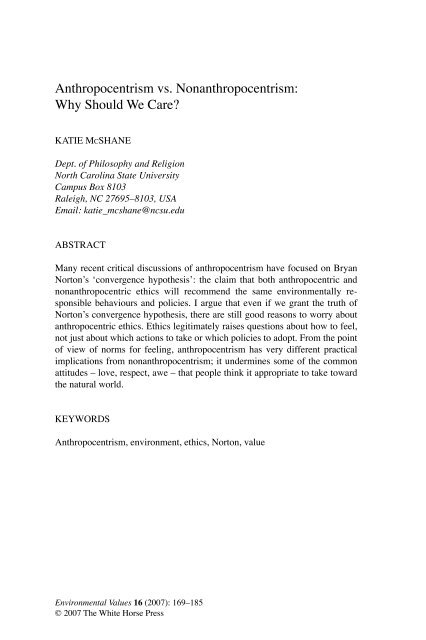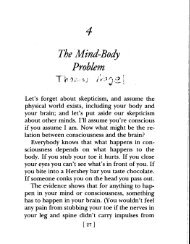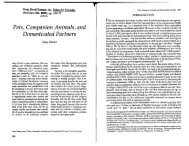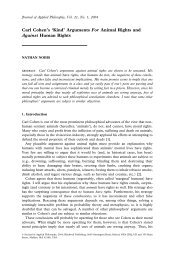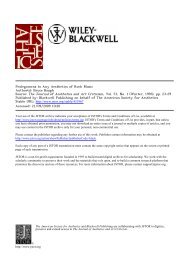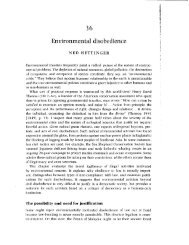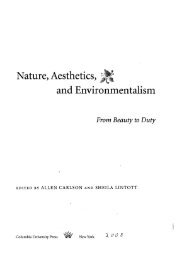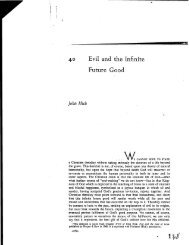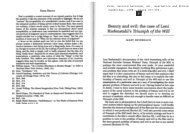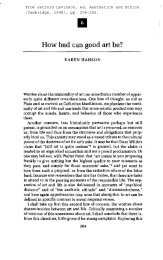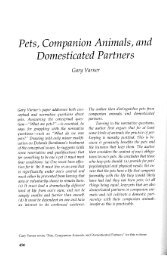Anthropocentrism vs. Nonanthropocentrism: Why Should We Care?
Anthropocentrism vs. Nonanthropocentrism: Why Should We Care?
Anthropocentrism vs. Nonanthropocentrism: Why Should We Care?
You also want an ePaper? Increase the reach of your titles
YUMPU automatically turns print PDFs into web optimized ePapers that Google loves.
<strong>Anthropocentrism</strong> <strong>vs</strong>. <strong>Nonanthropocentrism</strong>:<br />
<strong>Why</strong> <strong>Should</strong> <strong>We</strong> <strong>Care</strong>?<br />
KATIE MCSHANE<br />
Dept. of Philosophy and Religion<br />
North Carolina State University<br />
Campus Box 8103<br />
Raleigh, NC 27695–8103, USA<br />
Email: katie_mcshane@ncsu.edu<br />
ABSTRACT<br />
Many recent critical discussions of anthropocentrism have focused on Bryan<br />
Nortonʼs ʻconvergence hypothesisʼ: the claim that both anthropocentric and<br />
nonanthropocentric ethics will recommend the same environmentally responsible<br />
behaviours and policies. I argue that even if we grant the truth of<br />
Nortonʼs convergence hypothesis, there are still good reasons to worry about<br />
anthropocentric ethics. Ethics legitimately raises questions about how to feel,<br />
not just about which actions to take or which policies to adopt. From the point<br />
of view of norms for feeling, anthropocentrism has very different practical<br />
implications from nonanthropocentrism; it undermines some of the common<br />
attitudes – love, respect, awe – that people think it appropriate to take toward<br />
the natural world.<br />
KEYWORDS<br />
<strong>Anthropocentrism</strong>, environment, ethics, Norton, value<br />
Environmental Values 16 (2007): 169–185<br />
© 2007 The White Horse Press
170<br />
KATIE MCSHANE<br />
For at least the last 30 years now, there has been a running debate among environmental<br />
ethicists about whether anthropocentrism can serve as an adequate<br />
foundation for environmental ethics. The most recent discussions of this issue<br />
have concerned Bryan Nortonʼs ʻconvergence hypothesisʼ – the view that if we<br />
have a suitably sophisticated anthropocentrism, then in practice, anthropocentrism<br />
and nonanthropocentrism will converge. 1 That is to say, they will both<br />
recommend the same environmentally responsible behaviours and policies. If<br />
this is so, then one might think the dispute between them is merely academic<br />
– a matter for ʻintramural philosophical debateʼ, but nothing more. 2<br />
In this paper, I grant for the sake of argument that anthropocentric and nonanthropocentric<br />
ethics will converge when it comes to the policies and behaviours<br />
they recommend. I also grant that as practical ethicists, we should demand that<br />
there be an issue of practical importance at stake before we commit our time and<br />
energy (not to mention journal space, etc.) to addressing a theoretical dispute. If<br />
two theories have exactly the same practical implications, we shouldnʼt spend our<br />
time worrying about what other differences there might be between them. What<br />
I want to explore here is the question of what counts as a ʻpractical implicationʼ<br />
of an ethical theory. In practical ethics, we often talk as though ethical questions<br />
are just questions about which actions to take or which policies to adopt. There<br />
is, however, a long history in ethics of being concerned with questions of how<br />
to feel, what attitudes to take toward different things in the world, which things<br />
to care about and how to care about them. 3 The aim of this paper is to consider<br />
what significance the differences between anthropocentrism and nonanthropocentrism<br />
might have from the point of view of these questions.<br />
I. BACKGROUND<br />
First, some definitional clarity. Different authors have offered different definitions<br />
of ʻanthropocentrismʼ and ʻnonanthropocentrismʼ, so let me make clear at<br />
the outset what I take these terms to mean. <strong>Anthropocentrism</strong>, as I understand<br />
it, is the view that the nonhuman world has value only because, and insofar as,<br />
it directly or indirectly serves human interests. 4 <strong>Nonanthropocentrism</strong> is just<br />
the denial of this – i.e., the view that it isnʼt the case that the nonhuman world<br />
has value only because, and insofar as, it directly or indirectly serves human<br />
interests. 5<br />
One noteworthy feature of these definitions is that they remain silent on the<br />
issue of intrinsic value. There are two reason for this. First, there are quite a few<br />
different meanings of ʻintrinsic valueʼ in use, many of which seem to carry robust<br />
metaphysical implications. Since anthropocentrism is a normative view, not a<br />
metaphysical (or even metaethical) view, its definition should avoid a commitment<br />
to particular metaphysical positions as far as possible. But second, and perhaps<br />
more to the point, it is not true that the only way to deny anthropocentrism is<br />
Environmental Values 16.1
ANTHROPOCENTRISM VS. NONANTHROPOCENTRISM<br />
171<br />
to claim that nature has intrinsic value. One could deny anthropocentrism but<br />
claim that the value of every organism depends on the contribution it makes<br />
to the health of its ecosystem; one could deny anthropocentrism but claim that<br />
the value of every nonconscious being depends on whether conscious beings<br />
happen to care about it; one could deny anthropocentrism and claim that there<br />
is no such thing as intrinsic value at all; and so on. 6 <strong>Nonanthropocentrism</strong>, as<br />
defined above, denies that the centre of moral concern should be human interests,<br />
but this leaves it open whether the centre should be something else, or whether<br />
we should think there is a centre at all. While these are interesting questions,<br />
and while it could turn out that the best alternative theory is one that attributes<br />
intrinsic value to the natural world, the aim of the current paper is not to construct<br />
or defend a particular alternative theory, but rather to argue that adopting<br />
anthropocentrism would bring with it a significant cost. 7<br />
With this understanding of the concepts in mind, it may be useful to say<br />
something about what participants believe to be at stake in this debate. Proponents<br />
of nonanthropocentrism often claim that it is precisely the view that ʻitʼs<br />
really all about usʼ that got us into all of these environmental messes in the first<br />
place. In order to solve our environmental problems and avoid running into<br />
them again in the future, they claim, ethics needs to recognise the folly of such<br />
self-centeredness and develop an ethic of, as Tom Regan puts it, respect for<br />
nature rather than mere use of nature. 8 Other nonanthropocentrists claim that the<br />
wrong-headedness of anthropocentrism is evident once we take seriously what<br />
ecology has taught us about our relationship to the rest of the natural world. The<br />
more we understand about how the world works, they argue, the more evident it<br />
is that we are but one species among many, that we live interdependently with<br />
other parts of the natural world, and that we arenʼt as different from the rest of<br />
nature as we once might have thought. Getting clear about our ecological place<br />
in the world is humbling, and the claim is that this humility ought to carry over<br />
to claims about our moral place in the world. 9<br />
On the other side, anthropocentrists claim that insofar as environmental<br />
problems are due to ethical wrong-headedness, the mistake weʼve made isnʼt in<br />
thinking that only human interests matter directly, but rather in being ill-informed<br />
and short-sighted about what our interests really are. If we take seriously the<br />
interests of future generations of humans and get clear about all of the ways in<br />
which the health of the natural environment improves the quality of human lives,<br />
we will have all the arguments weʼd ever need to justify caring about the health<br />
of the environment, behaving in ways that are environmentally responsible, and<br />
adopting policies that are environmentally sustainable. 10<br />
Furthermore, anthropocentrists claim, anthropocentric approaches have a<br />
number of advantages over nonanthropocentric approaches. First, there are worries<br />
about whether nonanthropocentric ethics can be made philosophically viable.<br />
Though I wonʼt rehearse these debates here, the most well-known versions of<br />
nonanthropocentrism have been charged with metaphysical, epistemological,<br />
Environmental Values 16.1
172<br />
KATIE MCSHANE<br />
and/or normative inadequacy. 11 Anthropocentric ethics seems to have a better<br />
track record in this regard. Second, most traditional ethical theories are roughly<br />
anthropocentric in nature, so adopting anthropocentrism makes available a wide<br />
variety of theoretical resources that have been developed to explain, defend,<br />
and apply these theories. This is not true for nonanthropocentrism. Third, as<br />
Bryan Norton has pointed out, most policy-makers and social scientists are<br />
anthropocentrists, and anthropocentric assumptions underlie most of the work<br />
that they do. By granting their assumption of anthropocentrism, environmental<br />
ethicists open the door for more productive collaborative relationships with<br />
people who have a significant impact on shaping environmental policies. 12 And<br />
finally, anthropocentrism might offer hope as a strategy for rejecting the ʻpeople<br />
<strong>vs</strong>. natureʼ formulation that so many environmentalists find frustrating. If whatʼs<br />
good in nature is ultimately a matter of whatʼs good for people, then (we might<br />
think) there canʼt really be any deep conflict here.<br />
From the point of view of the anthropocentrist, then, our theory choice looks<br />
like this: <strong>We</strong> have on the one hand nonanthropocentrism, which recommends<br />
environmentally responsible behaviours, but is fairly radical, unpopular, and<br />
theoretically problematic. On the other hand we have anthropocentrism, which<br />
recommends the same environmentally responsible behaviours, but requires<br />
only minor changes in ethical beliefs that are already widely accepted, and is<br />
theoretically well worked out. If this is what weʼre deciding between, the choice<br />
looks obvious – only a fool would choose the nonanthropocentric route.<br />
Before jettisoning nonanthropocentrism, however, I think it would be useful<br />
to think carefully about what exactly we would be giving up. My suspicion is<br />
that we would be giving up more than this story suggests. In order to determine<br />
whether this is so, we should first get clear about how claims like those that<br />
constitute anthropocentrism and nonanthropocentrism fit into the structure of<br />
ethical theories in general.<br />
II. THE CLAIMS OF ANTHROPOCENTRISM AND THE STRUCTURE<br />
OF ETHICAL THEORIES<br />
<strong>Anthropocentrism</strong> claims that the nonhuman world and/or its parts have value<br />
only because, and insofar as, they directly or indirectly serve human interests. It<br />
is worth noticing that in the first instance, this is not a claim about how we ought<br />
to behave. It is a claim about which features of nonhuman things can make them<br />
matter in which ways. <strong>Anthropocentrism</strong> says that only one feature – serving<br />
human interests, directly or indirectly – can make a nonhuman thing valuable.<br />
Claims about why something has value are claims about why we, as moral agents,<br />
have reason to care about the thing. 13 More precisely, they are claims about why<br />
the thing is worth caring about. 14 <strong>Anthropocentrism</strong> says that when it comes to<br />
Environmental Values 16.1
ANTHROPOCENTRISM VS. NONANTHROPOCENTRISM<br />
173<br />
the nonhuman natural world, the only acceptable reasons of this kind are those<br />
that show a connection to the satisfaction of human interests.<br />
These claims about why we moral agents should care about a thing serve as<br />
the grounds for ethical norms concerning the thing. These ethical norms come<br />
in at least two flavours: norms for action (what we ought to do), and norms<br />
for feeling (how we ought to feel). 15 The picture we have so far, then, is this:<br />
anthropocentrism limits the kind of claims we can (justifiably) make about why<br />
certain things are worth caring about. The worry about anthropocentrism can thus<br />
be understood as the worry that since these claims serve to ground our ethical<br />
prescriptions, limiting the claims we can make might limit the kinds of ethical<br />
prescriptions we can offer. The worry about Nortonʼs convergence hypothesis,<br />
then, is a worry about what sorts of limits will be placed on our norms for action:<br />
if we accept anthropocentrism, will we still have a theory that can tell us<br />
to do the right things? The convergence hypothesis answers this question ʻyesʼ,<br />
and I will not challenge that claim here. 16<br />
But if anthropocentrism and nonanthropocentrism both tell us to do the same<br />
thing, and the right thing, how much is left for us to worry about? How different<br />
are anthropocentrism and nonanthropocentrism at this point? To see what<br />
differences remain, letʼs consider how the anthropocentrist can make her case<br />
for convergence when it comes to norms for action. <strong>Anthropocentrism</strong> tells us<br />
that the nonhuman world has value only insofar as it serves human interests.<br />
On this view, if I were to claim that some part of nonhuman nature has value<br />
in its own right, independently of human interests, I would be incorrect. Likewise,<br />
if I were to claim that some part of nonhuman nature has value because<br />
it serves the interests of another part of nonhuman nature, though these two<br />
parts donʼt serve human interests in any way, I would also be mistaken. But to<br />
say this isnʼt to say that anthropocentrism canʼt tell me to act as if parts of the<br />
nonhuman world had value in their own right. It might serve human interests,<br />
for example, to treat some part of the natural world as though it had a kind of<br />
value – sacredness, say – that doesnʼt depend at all on natureʼs furthering our<br />
interests. Perhaps if we treated some parts of our world as though they were<br />
sacred, we would all be better off for it. <strong>Anthropocentrism</strong> can wholeheartedly<br />
endorse such treatment.<br />
To grant the truth of the convergence hypothesis is to grant that, when it<br />
comes to claims about what we should do, both anthropocentric and nonanthropocentric<br />
reasons will support taking the same actions – i.e., both types of<br />
theory will produce the same action-norms. The justifications that they offer for<br />
these action-norms – i.e., the reasons they give for why we should take these<br />
actions – will be different, of course. But do we have any independent interest<br />
in differences among reasons if they lead to the same recommendations for<br />
action? Perhaps we would if we thought that some of the reasons offered were<br />
morally unacceptable. So, for example, a theory that says ʻbe environmentally<br />
good citizens because Hitler would want you toʼ would be objectionable because<br />
Environmental Values 16.1
174<br />
KATIE MCSHANE<br />
the reason it offers is itself objectionable. But nonanthropocentrists do not find<br />
appeals to human interests troubling in their own right; they just object to the<br />
claim that these are the only reasons to which one can appeal. 17 So nonanthropocentrists<br />
would happily grant that reasons of human interest are reasons that<br />
justify environmentally responsible policies and behaviours; they just donʼt<br />
think these are the only reasons that do so. Nevertheless, anthropocentrists have<br />
given them good ethical recommendations on the basis of reasons they accept<br />
– what more could an ethicist want?<br />
III. ANTHROPOCENTRISM AND QUESTIONS OF HOW TO FEEL<br />
The answer, I think, is to be found when we consider what effect anthropocentrism<br />
might have on our norms for feeling. Questions of how to feel arenʼt as<br />
widely discussed in ethics as questions of what to do are, but they are clearly an<br />
important part of the ethical picture. 18 While there isnʼt room here to rehearse<br />
all of the arguments for the moral importance of norms for feeling, I will briefly<br />
sketch a few of the most important considerations. 19 First, and perhaps most<br />
obviously, how we feel significantly affects how we act – if I like you, Iʼm more<br />
likely to be nice to you, etc. If ethics cares about how we act, then it ought to<br />
care about how we feel.<br />
Second, matters of feeling are an important part of what we care about in<br />
our social relationships, and not just because we think that how a person feels<br />
affects how she acts. For this reason, our interest in questions of how to feel isnʼt<br />
merely derivative of our interest in questions of what to do. I want my friends<br />
to like me, not just to act as though they do. And I donʼt just want them to like<br />
me because I think that their taking this attitude will make them behave more<br />
nicely toward me. My desire isnʼt that my friends adopt whatever attitude will<br />
produce the nicest behaviour; rather, my desire is that their behaviour express<br />
genuinely friendly feelings. As contemporary virtue ethicists have pointed out,<br />
our everyday moral judgments of people already take into account assessments<br />
of their feelings, not just their actions. 20 So, imagine someone who felt she was<br />
better than everyone else even though she didnʼt let this smug sense of superiority<br />
affect her actions, or imagine someone who hated people of other races<br />
but never acted on these feelings. While Iʼm sure we would be glad that these<br />
peopleʼs feelings didnʼt influence their actions, weʼd probably still be concerned<br />
about the fact that they had these feelings at all. People can take attitudes toward<br />
the world that we find morally troubling even when these attitudes donʼt lead<br />
them to perform bad actions.<br />
Third, questions of how to feel are also central in thinking about how to direct<br />
our own lives. When I think about what Iʼm aiming for in trying to be morally<br />
good, I donʼt just think about which actions to perform. I also think about how<br />
to feel about the world. I want to be emotionally oriented toward things in the<br />
Environmental Values 16.1
ANTHROPOCENTRISM VS. NONANTHROPOCENTRISM<br />
175<br />
right way. I donʼt just want to know whether I should act in a more sympathetic<br />
manner toward my friends; I want know whether I should be more sympathetic<br />
to them – and being sympathetic necessarily involves feeling sympathy. I donʼt<br />
just want to know whether I should act more proudly; I want to know whether<br />
I should be more proud – and being proud necessarily involves feeling pride.<br />
Our moral lives are lived from the inside, in the first person, and from this<br />
point of view we have an interest in more than just satisfying the claims that<br />
others legitimately make on us. <strong>We</strong> care not only about generating properly the<br />
ʻoutputsʼ (actions, behaviours, choices, etc.), but also about the inner life of the<br />
being who produces those outputs. <strong>We</strong> evaluate the moral goodness of our lives<br />
as lived from within. In the cases of both ourselves and others, then, norms for<br />
feeling are expressions of the independent moral interest that we take in the<br />
inner lives of human beings. 21<br />
Finally, questions about how we should feel about the world canʼt be reduced<br />
to questions about which ways of feeling best serve our interests, for questions<br />
about how to feel are also in part questions about which feelings are called for<br />
by their objects – which feelings are deserved, apt, or fitting. Discovering that it<br />
would be in my interest to feel admiration for my boss doesnʼt fully answer the<br />
question of whether I should admire her. 22 There is also the question of whether<br />
she deserves admiration – of whether she really is admirable.<br />
So we do have an ethical interest in answering questions about how to feel,<br />
and this doesnʼt just amount to wanting to know which actions to perform<br />
or which feelings it would be in our interest to have. But what effect would<br />
anthropocentrism have on the way that we answer such questions? To answer<br />
this, letʼs consider how the central claim of anthropocentrism might conflict<br />
with certain kinds of feelings.<br />
IV. FEELINGS AND THE SOURCES OF VALUE<br />
Some attitudes that we can take toward a thing are incompatible with thinking<br />
that its value is entirely dependent on its satisfaction of our interests. Take the<br />
case of love, for example. Suppose that I claim to love my friend, but I also<br />
claim that she only has value to the extent that she serves my interests. If she<br />
didnʼt serve my interests, I claim, she would have absolutely no value whatsoever.<br />
If I said this, you might well wonder whether I was being serious when I<br />
claimed to I love her. Would it help my case if I told you a long and complex<br />
story about all of the ways in which she serves my interests? I could explain<br />
that she brings joy to my life, that she inspires me to be a better person, that<br />
she allows me to see the world in new ways, and that her friendship is essential<br />
to having my life go the way I had always hoped it would go. Still, the story I<br />
am telling is an entirely self-centred one, and that is precisely the problem. The<br />
love involved in friendship is an other-centred emotion. 23 To love something in<br />
Environmental Values 16.1
176<br />
KATIE MCSHANE<br />
this way is in part to see it as having value that goes beyond what it can do for<br />
you. Certainly it does serve our interests to participate in loving relationships.<br />
But to love a friend is in part to deny that her value is just a matter of her serving<br />
your interests. 24<br />
I think that there are other attitudes besides love of which this is also true.<br />
Respect certainly seems to work this way; awe (at least in some manifestations)<br />
might do so as well. To respect something is in part to see it as making a claim<br />
on your moral attention in its own right. It is to attribute to the thing a kind of<br />
independent standing in your scheme of ʻthings that matterʼ. To be in awe of<br />
something is in part to see it as having a kind of greatness that goes beyond you<br />
– beyond your needs, interests, or attitudes. In fact, the awe that we feel toward<br />
some things (the might of the ocean, the power of a volcanic eruption, the size of<br />
the universe) seems to be enhanced by the fact of their utter indifference to our<br />
interests. Thus while it might be in our interest to live lives that involve feeling<br />
love, respect and awe for certain parts of the world, to take up these valuing<br />
attitudes is precisely to see the world as valuable in ways other than serving our<br />
interests. 25 If this is right, then at least some of the attitudes that we take toward<br />
things would be undermined by the belief that they only have value insofar as<br />
they serve our interests. Holmes Rolston makes a similar point about certain<br />
religious attitudes that one might take toward nonhuman nature. He says,<br />
If nature is used as a hospital or school for character, that is clearly an instrumental<br />
use, but what shall we say when nature is used as a church? Is this too<br />
an instrumental use – to generate human religious experiences, nothing more?<br />
Perhaps. But some of these experiences will involve a recognition of Godʼs<br />
creation, or the Ultimate Reality, or a Nature sacred in itself. In fact, one profanes<br />
such experience and nature alike to see nature as merely instrumental and<br />
otherwise devoid of value. 26<br />
It is worth noticing that this incompatibility is much more of a problem in<br />
the case of feelings than it is in the case of actions. While anthropocentrism<br />
can tell me to act as though something has value in its own right even when I<br />
know it doesnʼt, itʼs much less clear that anthropocentrism can tell me to feel<br />
as though something has value in its own right even when I know it doesnʼt. 27<br />
If I think that your only value is what you can do for me, I might be able to act<br />
as though I love you if I judge it in my self-interest to do so. But itʼs not at all<br />
clear that I can actually love you, for loving you requires me to see you as having<br />
a value that is independent of me. The problem here is that because many<br />
emotions have a cognitive element, norms for feeling are more tightly connected<br />
to beliefs about value than norms for action are. I can act as if A matters even<br />
while believing that A doesnʼt matter. But because part of what it is to feel that<br />
A matters is to think of A as mattering, 28 itʼs not clear that I can feel that A matters<br />
while believing that A doesnʼt matter. Perhaps I can; the human mind is<br />
complex enough that it may be psychologically possible to think of the world<br />
Environmental Values 16.1
ANTHROPOCENTRISM VS. NONANTHROPOCENTRISM<br />
177<br />
as being one way while believing that it is another. But one thing is certain: the<br />
world canʼt be both ways. While philosophers of the emotions disagree on the<br />
precise nature of the cognitive aspect of the emotions, they agree on its direction<br />
of fit. Knowledge, belief, perception, discernment: all of these cognitive states<br />
aim to fit the world – that is, they aim to accurately describe the way the world<br />
is. The problem for the person who both thinks of A as mattering and believes<br />
that A doesnʼt matter is that she has two cognitive states, both of which aim to<br />
be correct descriptions of the world, and they canʼt both be right. What kind<br />
of a problem this is – whether it is a form of irrationality, logical impossibility,<br />
cognitive dissonance – will depend on oneʼs overall theory of rationality. My<br />
only claim here is that most of us take these states to be a problem, and that if<br />
we do, we will have reason to worry about anthropocentrism. 29<br />
The upshot of this is that the central claim of anthropocentrism is incompatible<br />
with certain kinds of attitudes we might want to take toward the natural<br />
world – love, respect and awe; perhaps others as well. Thus according to<br />
anthropocentrism, the way that these attitudes involve seeing the value of the<br />
natural world must be fundamentally incorrect. If to love something is to think<br />
of it as having a kind of value that doesnʼt depend on us and our interests, then<br />
according to anthropocentrism, to love the natural world is to make a mistake<br />
about its value.<br />
So even if anthropocentrism doesnʼt change what we think it makes sense to<br />
do in the world, it might well change how we think it makes sense to feel about<br />
the world. In particular, if I am right that the central claim of anthropocentrism<br />
is incompatible with the attitudes of love, respect and awe, then insofar as anthropocentrism<br />
is true, we are making a kind of mistake when we love the land,<br />
respect nature, are in awe of the vastness of the universe, or take other attitudes<br />
that are incompatible with thinking that their objectʼs only value is in serving<br />
our interests. On the other hand, if these attitudes are appropriate, then we have<br />
good reason to worry about the adequacy of anthropocentrism.<br />
V. HOW DOES IT MAKE SENSE TO FEEL TOWARD NONHUMAN<br />
NATURE?<br />
So is it appropriate to take these kinds of attitude toward the natural world? It<br />
seems that many of us, even after much thought and careful reflection, think<br />
so. In the case of love, for example, consider the ways people feel toward individual<br />
animals, particularly those who live with humans as companions. If<br />
loving something involves seeing it as having value that doesnʼt depend on its<br />
serving our interests, then anthropocentrism says that Iʼm making a mistake<br />
when I love my dog. To say that itʼs a mistake to love a dog would, at least for<br />
many people, constitute a reductio ad absurdum of anthropocentrism.<br />
Environmental Values 16.1
178<br />
KATIE MCSHANE<br />
The harder cases may be things like ecosystems, species, and places. Does<br />
love of the land or respect for nature involve a kind of mistake? The phrases<br />
ʻlove of the landʼ and ʻrespect for natureʼ probably sound familiar, for the<br />
environmentalist literature has a long history of recommending these sorts of<br />
attitudes as appropriate ones to take toward the natural world. In fact, in its less<br />
policy-wonkish moments, the environmentalist literature has lots to say about<br />
how we ought to feel about the world we live in, about what sorts of attitudes<br />
toward it and its parts are appropriate, about what kinds of emotional orientation<br />
to the natural world would be good ones.<br />
Consider the case of ʻlove of the landʼ. In environmentalist literature, this<br />
phrase is used to denote not love toward any land whatsoever, nor toward land<br />
understood simply as soil, but rather the affection one feels toward a particular<br />
place – toward the nonhuman parts of the community to which one belongs. Aldo<br />
Leopold often spoke of the sandy flatlands of central Wisconsin with this kind of<br />
affection and compared loving and cherishing this land to loving and cherishing<br />
a friend. 30 Barry Lopez refers to ʻa kind of love – agape – between me and the<br />
placeʼ, and laments that people today have missed ʻthe more lasting, the more<br />
valuable and sustaining experience of intimacy with [the place in which they<br />
live], the spiritual dimension of a responsible involvement with this placeʼ. 31<br />
David James Duncan describes how he fell ʻheart over head in loveʼ with the<br />
Blackfoot River, then later the grief he felt after witnessing the damage done to<br />
it by deforestation of surrounding areas. 32 Other environmentalists talk of loving<br />
deserts, swamps, ponds, rivers. 33 In fact, this love of the land is cited by many<br />
prominent environmentalists (e.g., John Muir, Robert Marshall, Sigurd Olson,<br />
Paul Watson) as what motivated them to become activists in the first place. 34<br />
These people arenʼt just describing a heightened state of enjoyment when they<br />
talk about love, as one might be when saying that one loves chocolate. They are<br />
describing the kind of emotional bond that people often have with their friends<br />
or family, but also sometimes with dogs, trees, deserts, forests, and the like.<br />
<strong>We</strong> can also find expressions of the attitudes of respect and awe in the environmentalist<br />
literature. While I wonʼt run through a list of examples for each<br />
of these, they arenʼt difficult to find. If one reads through the environmentalist<br />
literature asking what attitudes the author is expressing toward the natural<br />
world (or some part thereof) and what attitudes the author is urging upon her<br />
readers, one will find a wide variety of attitudes, some of them compatible with<br />
anthropocentric claims about value but many of them not. 35<br />
I donʼt pretend to have given an argument for the claim that it is right to<br />
take the attitudes of love, respect, and awe toward the natural world and/or its<br />
parts. That would take more room, and perhaps different methods of persuasion,<br />
than are available here. But it is worth noticing that quite a few people do take<br />
these attitudes, and it isnʼt clear what mistake they might be making in doing<br />
so. Of course, to say this isnʼt to say anything that would persuade a committed<br />
sceptic. But insofar as we arenʼt sceptics – insofar as we think it is at least<br />
Environmental Values 16.1
ANTHROPOCENTRISM VS. NONANTHROPOCENTRISM<br />
179<br />
sometimes appropriate to take these attitudes toward the natural world, or even<br />
insofar as we want to avoid theories that reject this possibility out of hand, we<br />
have reason to worry about anthropocentrism. Itʼs one thing to say that ethics<br />
shouldnʼt recommend love-of-nature to everyone; itʼs another thing to say that<br />
to love nature is to make a mistake.<br />
Thus from the point of view of norms for feeling, anthropocentrism does<br />
have very different practical implications from nonanthropocentrism, and this<br />
is a difference about which we have reason to care. Even if anthropocentrism<br />
leaves us with good policy recommendations, it will constrain the ways in<br />
which we think it makes sense to care about the natural world. Specifically, it<br />
will rule out certain ways of caring as inappropriate to nonhuman objects. The<br />
environmentalist literature has at least given us some good reasons to worry<br />
about whether these are constraints we should be willing to accept.<br />
Now, given the enormity of the environmental problems we currently face,<br />
I am not arguing that we should all just turn our attention inward and work on<br />
getting our feelings straight. Adopting good environmental policies and getting<br />
people to act in environmentally responsible ways should be a priority, especially<br />
given the urgency of many environmental problems. But there is room within (or<br />
perhaps alongside) that project for asking how we ought to feel about the world<br />
we live in. In that context, the differences between anthropocentrism and nonanthropocentrism<br />
are considerable and, I think, still well worth our attention.<br />
NOTES<br />
An earlier version of this paper was presented at the International Society for Environmental<br />
Ethics and International Association for Environmental Philosophy Joint Conference<br />
in June of 2004. I am grateful to Simon Keller for his astute commentary and to<br />
the conference participants for many useful comments and criticisms. I thank Elizabeth<br />
Anderson, Alan Carter, Stephen Darwall, Patrick Frierson, Lori Gruen, Avram Hiller,<br />
Dale Jamieson, Jeff Kasser, Robert Mabrito, Scott McElreath, and Doug McLean for<br />
helpful discussions of ideas presented here. In addition, I thank two anonymous reviewers<br />
for their thoughtful comments.<br />
1<br />
Nortonʼs discussion of the convergence hypothesis can be found at Norton 1991:<br />
237–43.<br />
2<br />
This phrase is from Light 2002: 436.<br />
3<br />
It is feelings rather than actions, for example, that distinguish Aristotleʼs virtuous person<br />
from the merely continent person. See EN 1147b20 ff. For historical treatments of the role<br />
of feeling and sentiment in ethics, see Darwall 1995 and Bell 2000. For contemporary<br />
accounts, see Oakley 1992 and Nichols 2004.<br />
4<br />
While this is a claim about the value of the nonhuman world in general, it is (at least<br />
in environmental ethics) only controversial in the case of the nonhuman natural world.<br />
Environmental Values 16.1
180<br />
KATIE MCSHANE<br />
Thus the discussion that follows will be focused on the case of nonhuman nature. It is<br />
an open question how many of these worries apply to artefacts.<br />
The discussion that follows will also focus on claims about positive value, rather than<br />
negative or neutral value. Here I will follow most writers in assuming that the conclusions<br />
drawn about positive value will apply mutatis mutandis to neutral and negative value.<br />
5<br />
For reference, here are some definitions that others have given of anthropocentrism.<br />
J. Baird Callicott: the view that ʻregards all forms of life, as being only instrumentally<br />
valuable, i.e., valuable only to the extent that they are means or instruments which may<br />
serve human beingsʼ, Callicott 1984: 299; the view that ʻthere exists no value independent<br />
from human experienceʼ, Callicott 1989b: 265; the view that nature does not have intrinsic<br />
value, Callicott 1999: 14–15; Eric Katz: ʻboth the idea that human interests, human<br />
goods, and/or human values are the focal point of any moral evaluation of environmental<br />
policy, and the idea that these human interests, goods, and values are the basis of any<br />
justification of an environmental ethicʼ, Katz 1999: 377–8 (emphasis omitted); Bryan<br />
Norton: ʻthe view that only humans are loci of fundamental valueʼ, Norton 1984: 132;<br />
ʻthe view that the earth and all its nonhuman contents exist or are available for manʼs<br />
benefit and to serve his interests and, hence, that man is entitled to manipulate the world<br />
and its systems as he wants, that is, in his interestsʼ, Norton 1987:136, quoting Routley<br />
and Routley 1979; Anthony <strong>We</strong>ston: the view that ʻhuman beings, or some particular and<br />
unique human characteristics...are the only ends in themselvesʼ, <strong>We</strong>ston 1996: 286. See<br />
also Hayward 1997 for a discussion of the different meanings of this term.<br />
6<br />
An anonymous reviewer claims that any view on which the value of organisms depends<br />
on their ecosystemic contributions would require one to say that the whole planet has<br />
intrinsic value. The idea is that believing in the existence of extrinsic or relational value<br />
will commit us to believing in the existence of intrinsic value. However, I agree with<br />
Beardsley 1965 and others who have argued that this is not the case. It will only be true<br />
if we assume a foundationalist picture of moral justification, which we neednʼt do.<br />
7<br />
But see McShane 2007, where I do defend a particular alternative theory.<br />
8<br />
Regan 1981; Regan 1992. See also Sylvan 1973 and Goodpaster 1979.<br />
9<br />
See, e.g., Callicott 1989a and Taylor 1980, part 3. For criticisms of this type of argument,<br />
see Holland 1996.<br />
10<br />
See, e.g., Norton 1984.<br />
11<br />
See, e.g., Rolston 1988, which is criticised in Callicott 1992, as well as Rolston 1982<br />
and Rolston 1983, which are criticised in Partridge 1986 (but see Preston 1998 for a<br />
defence of Rolstonʼs view). See also Callicott 1985, which is criticised in Norton 1995<br />
and Donner 2002. Of such criticisms, I think the following can fairly be said: (1) many<br />
nonanthropocentric ethical theories have run into significant theoretical problems; however,<br />
(2) nonanthropocentric theories, or at least the environmentalist versions of them,<br />
havenʼt been around for that long; and (3) many of these problems seem to stem from<br />
features of the theories other than their nonanthropocentrism.<br />
12<br />
See Norton 1991 and 1999.<br />
13<br />
See Brentano 1969, Anderson 1993, DʼArms and Jacobson 2000, Gaus 1990 and<br />
McDowell 1997. Having reason to do or care, in this context, should be understood as<br />
having a pro tanto reason, not having an all-things-considered reason. That is to say, it<br />
counts as a reason, though one that could be outweighed, overridden, or undermined<br />
Environmental Values 16.1
ANTHROPOCENTRISM VS. NONANTHROPOCENTRISM<br />
181<br />
by other reasons. The ʻshouldsʼ and ʻoughtsʼ that are generated by such reasons should<br />
also be understood as pro tanto.<br />
14<br />
This distinguishes them from other reasons for caring – prudential reasons, for example.<br />
It can, in some circumstances, be in my interest to care about things that arenʼt worth<br />
caring about. For a further discussion of this issue, see DʼArms and Jacobson 2000 and<br />
Rabinowicz and Rønnow-Rasmussen 2004.<br />
15<br />
Anderson 1993; Gibbard 1990; Hursthouse 1999: 108; Oakley 1992, Ch. 6. (While<br />
there is fairly widespread agreement about this claim, there is less agreement about how<br />
we should understand relationship between these two kinds of norms and the role they<br />
play in ethics.) Above, and in what follows, I do not use the term ʻfeelingʼ in the sense it<br />
has taken on in the literature on philosophy of the emotions, where it has come to mean<br />
something like ʻsensationʼ. I use it in the more ordinary, colloquial sense to designate<br />
emotions in general. Of course, the distinction between doing and feeling I am employing<br />
here is a fairly crude one, and there isnʼt room to work out an adequately detailed<br />
account of it here. I trust that there is enough content to our ordinary understanding of<br />
these concepts to make sense of the claims I wish to make involving them.<br />
16<br />
But see Steverson 1995, Stenmark 2002, and Saner 2000 for challenges to Nortonʼs<br />
claim.<br />
17<br />
Thus I disagree with Andrew Lightʼs claim that nonanthropocentrists are committed to<br />
the view that ʻeven a limited endorsement of anthropocentric forms of valuation of nature<br />
would necessarily give credence to those anthropocentric values that prefer development<br />
over preservationʼ (Light 2002: 429).<br />
18<br />
Both feminists and ecofeminists have been urging the importance of questions of<br />
how to feel for quite some time. See, e.g., Karen Warrenʼs discussion of Marilyn Fryeʼs<br />
distinction between ʻarrogant perceptionʼ and ʻloving perceptionʼ in Warren 1990.<br />
19<br />
For a more extended discussion of some of these issues, see Murdoch 2001.<br />
20<br />
See, e.g., Baier 1995: 30–1; Slote 1992: 89.<br />
21<br />
Many of those who think of peopleʼs inner lives (including their feelings) as outside the<br />
scope of moral evaluation, I think, confuse the question of what weʼre entitled to expect<br />
from others – i.e., what claims or obligations we can legitimately place on them – with<br />
the question of what it makes sense to evaluate in ourselves or others. (Thanks to Jeff<br />
Kasser for this way of putting the point.) As Iris Murdoch (citing Hume) points out, ʻgood<br />
political philosophy is not necessarily good moral philosophyʼ (Murdoch 2001: 79).<br />
22<br />
Whether it answers this question at all is a matter of some debate. Some claim that it<br />
answers the question of whether I should try to get myself to admire her, though not the<br />
question of whether I should admire her. For a discussion of this issue, see Rabinowicz<br />
and Rønnow-Rasmussen 2004.<br />
23<br />
Notice that this claim is limited to a particular form of love, namely the love involved<br />
in friendship. The English word ʻloveʼ can be used to refer to a number of very different<br />
valuing attitudes, and I do not want to claim that all of them have the structure I describe<br />
here. My love of sweet potato pie or rock climbing, for example, may well be compatible<br />
with thinking that their value is entirely instrumental. Thanks to Simon Keller for<br />
urging the importance of this point.<br />
24<br />
For a discussion of the structure of attitudes such as this, see Anderson 1993: 8–11,<br />
205–7; for a discussion of the kind of valuing involved in love, see Velleman 1999.<br />
Environmental Values 16.1
182<br />
KATIE MCSHANE<br />
25<br />
Notice that here I do not make the further claim that the attitudes of love, respect and<br />
awe involve seeing their objects as having value in their own right. For a discussion of<br />
this issue, see McShane 2007.<br />
26<br />
Rolston 1988: 25–6.<br />
27<br />
This might depend on how distinguish actions from feelings. If we count ʻadopting an<br />
attitude toward somethingʼ as an action, then the problems I raise here for feeling-norms<br />
will make trouble for some action-norms as well.<br />
28<br />
Or to see A as mattering, or to believe that A matters, or to judge that A matters – how<br />
one construes this will depend on oneʼs theory of the emotions in general, and the relevant<br />
emotion in particular.<br />
29<br />
An anonymous reviewer raises the following objection: ʻI think I am able to feel awe<br />
for some impressive piece of human engineering, say the Boulder Dam or the pyramids,<br />
while believing simultaneously that the Dam itself serves only an instrumental purpose<br />
and has no value other than that of providing energy for humans.ʼ In this case, the reviewer<br />
believes that while the Dam is awesome, its awesomeness makes no contribution at all to<br />
its value – it would be just as good if it was small, ordinary, not very well put together,<br />
designed by a few mediocre engineers, etc., just as long as it did its job of providing<br />
energy for humans. In this case, I am inclined to doubt that what the reviewer is feeling<br />
is really awe. Insofar as awe is a valuing attitude, it isnʼt just the thought ʻMy, what a<br />
large object!ʼ Itʼs valuing something in virtue of its greatness. But by hypothesis, this<br />
person thinks that its greatness isnʼt a reason to value it – the only aspect of it that merits<br />
valuation is its energy-producing abilities.<br />
30<br />
See Leopold 1970: 189–90. See also Sagoff 1991.<br />
31<br />
OʼConnell 1998: 81.<br />
32<br />
Duncan 1998: 45–9.<br />
33<br />
Abbey 1977: 12; Johnson 1998: 57; Hoagland 1999: 83; Duncan 1998.<br />
34<br />
Vickery 1994.<br />
35<br />
For discussions of respect and awe in particular, see Leopold 1970 and Naess 1973 on<br />
respect and Fowles 1983 and Muir 1987 on awe.<br />
REFERENCES<br />
Abbey, Edward. 1977. The Journey Home. New York: Penguin Books.<br />
Anderson, Elizabeth. 1993. Value in Ethics and Economics. Cambridge, MA: Harvard<br />
University Press.<br />
Baier, Annette. 1995. Moral Prejudices: Essays on Ethics. Cambridge, MA: Harvard<br />
University Press.<br />
Beardsley, Monroe C. 1965. ʻIntrinsic valueʼ, Philosophy and Phenomenological Research<br />
26: 1–17.<br />
Bell, Michael. 2000. Sentimentalism, Ethics and the Culture of Feeling. Houndmills,<br />
Basingstoke, Hampshire: Palgrave.<br />
Brentano, Franz. 1969. The Origin of Our Knowledge of Right and Wrong. London:<br />
Routledge & Kegan Paul.<br />
Environmental Values 16.1
ANTHROPOCENTRISM VS. NONANTHROPOCENTRISM<br />
183<br />
Callicott, J. Baird. 1984. ʻNon-anthropocentric value theory and environmental ethicsʼ,<br />
American Philosophical Quarterly 21: 299–309.<br />
Callicott, J. Baird. 1985. ʻIntrinsic value, quantum theory, and environmental ethicsʼ,<br />
Environmental Ethics 7: 257–275.<br />
Callicott, J. Baird. 1989a. ʻThe conceptual foundations of the land ethicʼ, in J. Baird<br />
Callicott (ed.), In Defense of the Land Ethic (Albany: State University of New York<br />
Press), pp. 75–99.<br />
Callicott, J. Baird. 1989b. In Defense of the Land Ethic. Albany: State University of<br />
New York Press.<br />
Callicott, J. Baird. 1992. ʻRolston on intrinsic value: a deconstructionʼ, Environmental<br />
Ethics 14: 129–143.<br />
Callicott, J. Baird. 1999. Beyond the Land Ethic: More Essays in Environmental Philosophy.<br />
Albany: State University of New York Press.<br />
DʼArms, Justin, and Daniel Jacobson. 2000. ʻSentiment and valueʼ, Ethics 110:<br />
722–748.<br />
Darwall, Stephen. 1995. The British Moralists and the Internal ʻOughtʼ: 1640–1740.<br />
Cambridge: Cambridge University Press.<br />
Donner, <strong>We</strong>ndy. 2002. ʻ Callicott on intrinsic value and moral standing in environmental<br />
ethicsʼ, in Wayne Ouderkirk and Jim Hill (eds.), Land, Value, Community: Callicott<br />
and Environmental Philosophy (Albany: SUNY Press), pp. 99–105.<br />
Duncan, David James. 1998. ʻThe war for Normanʼs Riverʼ, Sierra 83(3): 45–9.<br />
Fowles, John. 1983. The Tree. New York: Ecco Press.<br />
Gaus, Gerald F. 1990. Value and Justification: The Foundations of Liberal Theory.<br />
Cambridge: Cambridge University Press.<br />
Gibbard, Allan. 1990. Wise Choices, Apt Feelings. Cambridge, MA: Harvard University<br />
Press.<br />
Goodpaster, K. E. 1979. ʻFrom egoism to environmentalismʼ, in K.E. Goodpaster and<br />
K.M. Sayre (eds.), Ethics and Problems of the 21st Century (Notre Dame, IN: Notre<br />
Dame University Press), pp. 21–35.<br />
Hayward, Tim. 1997. ʻ<strong>Anthropocentrism</strong>: a misunderstood problemʼ, Environmental<br />
Values 6: 49–63.<br />
Hoagland, Edward. 1999. ʻEarthʼs eyeʼ, Sierra 84: 60–65, 82, 83.<br />
Holland, Alan. 1996. ʻThe use and abuse of ecological concepts in environmental ethicsʼ,<br />
in N.S. Cooper and R.C.J. Carling (eds.), Ecologists and Ecological Judgments<br />
(New York: Chapman and Hall), pp. 27–41.<br />
Hursthouse, Rosalind. 1999. On Virtue Ethics. Oxford: Oxford University Press.<br />
Johnson, Trebbe. 1998. ʻThe second Creation story: redefining the bond between religion<br />
and ecologyʼ, Sierra 83: 53–7.<br />
Katz, Eric. 1999. ʻA pragmatic reconsideration of anthropocentrismʼ, Environmental<br />
Ethics 21: 377–390.<br />
Leopold, Aldo. 1970. A Sand County Almanac. With Essays on Conservation from Round<br />
River. New York: Ballantine Books.<br />
Light, Andrew. 2002. ʻContemporary environmental ethics: from metaethics to public<br />
philosophyʼ, Metaphilosophy 33(4): 426–449.<br />
Environmental Values 16.1
184<br />
KATIE MCSHANE<br />
McDowell, John. 1997. ʻValues and secondary qualitiesʼ, in Stephen Darwall et al. (eds.),<br />
Moral Discourse and Practice: Some Philosophical Approaches (Oxford: Oxford<br />
University Press), pp. 201–213.<br />
McShane, Katie. 2007. ʻ<strong>Why</strong> environmental ethics shouldnʼt give up on intrinsic valueʼ,<br />
forthcoming in Environmental Ethics.<br />
Muir, John. 1987. My First Summer in the Sierra. New York: Penguin Books.<br />
Murdoch, Iris. 2001. The Sovereignty of Good. London: Routledge Classics.<br />
Naess, Arne. 1973. ʻThe shallow and the deep, long-range ecology movement: a summaryʼ,<br />
Inquiry 16: 95–100.<br />
Nichols, Shaun. 2004. Sentimental Rules: On the Natural Foundations of Moral Judgement.<br />
Oxford: Oxford University Press.<br />
Norton, Bryan G. 1984. ʻEnvironmental ethics and weak anthropocentrismʼ, Environmental<br />
Ethics 6: 131–148.<br />
Norton, Bryan G. 1987. <strong>Why</strong> Preserve Natural Variety? Princeton: Princeton University<br />
Press.<br />
Norton, Bryan G. 1991. Toward Unity Among Environmentalists. New York: Oxford<br />
University Press.<br />
Norton, Bryan G. 1995. ʻ<strong>Why</strong> I am not a nonanthropocentrist: Callicott and the failure<br />
of monistic inherentismʼ, Environmental Ethics 17: 341–358.<br />
Norton, Bryan G. 1999. ʻPragmatism, adaptive management, and sustainabilityʼ, Environmental<br />
Values 8: 451–466.<br />
Oakley, Justin. 1992. Morality and the Emotions. London: Routledge.<br />
OʼConnell, Nicholas. 1998. ʻOn sacred groundʼ, Sierra 83: 58–61, 81.<br />
Partridge, Ernest. 1986. ʻValues in nature: is anybody there?ʼ Philosophical Inquiry 8:<br />
96–110.<br />
Preston, Christopher J. 1998. ʻEpistemology and intrinsic values: Norton and Callicottʼs<br />
critiques of Rolstonʼ, Environmental Ethics 20: 409–428.<br />
Rabinowicz, Wlodek, and Toni Rønnow-Rasmussen. 2004. ʻThe strike of the demon:<br />
on fitting pro-attitudes and valueʼ, Ethics 114: 391–423.<br />
Regan, Tom. 1981. ʻThe nature and possibility of an environmental ethicʼ, Environmental<br />
Ethics 3: 19–34.<br />
Regan, Tom. 1992. ʻDoes environmental ethics rest on a mistake?ʼ Monist 75: 161–<br />
182.<br />
Rolston, Holmes, III. 1982. ʻAre values in nature subjective or objective?ʼ Environmental<br />
Ethics 4: 125–151.<br />
Rolston, Holmes, III. 1983. ʻValues gone wildʼ, Inquiry 26: 181–207.<br />
Rolston, Holmes, III. 1988. Environmental Ethics. Philadelphia: Temple University<br />
Press.<br />
Routley, Richard, and Val Routley. 1979. ʻAgainst the inevitability of human chauvinismʼ,<br />
in K.E. Goodpaster and K.M. Sayre (eds.), Ethics and Problems of the 21st Century<br />
(Notre Dame, IN: University of Notre Dame Press), pp. 36–59.<br />
Sagoff, Mark. 1991. ʻZuckermanʼs Dilemma: a plea for environmental ethicsʼ, Hastings<br />
Center Report 21(5): 32–40.<br />
Environmental Values 16.1
ANTHROPOCENTRISM VS. NONANTHROPOCENTRISM<br />
185<br />
Saner, Marc A. 2000. ʻBiotechnology, the limits of Nortonʼs convergence hypothesis,<br />
and implications for an inclusive concept of healthʼ, Ethics and the Environment<br />
5: 229–42.<br />
Slote, Michael. 1992. From Morality to Virtue. Oxford: Oxford University Press.<br />
Stenmark, Mikael. 2002. ʻThe relevance of environmental ethical theories for policy<br />
makingʼ, Environmental Ethics 24: 135–148.<br />
Steverson, Brian K. 1995. ʻContextualism and Nortonʼs convergence hypothesisʼ, Environmental<br />
Ethics 17: 135–150.<br />
Sylvan, Richard. 1973. ʻIs there a need for a new, an environmental ethic?ʼ Proceedings<br />
of the XII World Conference of Philosophy(1): 205–210.<br />
Taylor, Paul. 1980. Respect for Nature: A Theory of Environmental Ethics. Princeton:<br />
Princeton University Press.<br />
Velleman, J. David. 1999. ʻLove as a moral emotionʼ, Ethics 109: 338–374.<br />
Vickery, Jim Dale. 1994. Wilderness Visionaries. Minocqua, WI: NorthWord Press.<br />
Warren, Karen. 1990. ʻThe power and promise of ecological feminismʼ, Environmental<br />
Ethics 12(2): 125–146.<br />
<strong>We</strong>ston, Anthony. 1996. ʻBeyond intrinsic value: pragmatism in environmental ethicsʼ,<br />
in Andrew Light, and Eric Katz (eds.), Environmental Pragmatism (London:<br />
Routledge), pp. 285–306.<br />
Environmental Values 16.1


